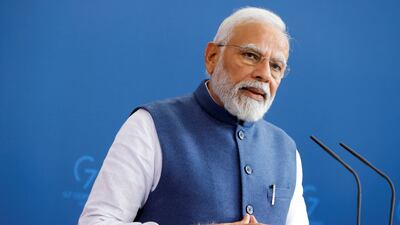Indian Prime Minister Narendra Modi on Thursday said that the World Health Organisation needs reforms to combat future health emergencies and sought flexibility in the World Trade Organisation’s rules on intellectual property rights.
Mr Modi was speaking at the Second Global Covid Virtual Summit co-hosted by the US, along with Germany, Indonesia, Senegal and Belize.
US President Joe Biden invited India’s prime minister to the summit, of which the theme is “Preventing Pandemic Fatigue and Prioritising Preparedness”.
In his remarks during the summit’s opening session, Mr Modi said the global health body needs resilient health security architecture to fight future health emergencies.
“It is clear that a co-ordinated global response is required to combat future health emergencies … [the] WHO must be reformed and strengthened to build a more resilient global health security architecture,” Mr Modi said.
His comments came at a time of heightened friction between India and the UN health body centred on the pandemic death toll.
WHO figures suggest India’s true death toll may be far higher than the government has reported.
Mr Modi also called for making World Trade Organisation’s rules related to trade-related aspects of intellectual property rights, or Trips, flexible.
Along with South Africa, India had placed a proposal at the WTO for temporarily waiving the intellectual property rights for producing Covid-19 vaccines in October 2020.
Three months later, in January last year, it had given an emergency approval to Oxford-AstraZeneca’s Covishield and home-grown Covaxin and launched the world’s largest inoculation programme.
Mr Modi said that India has not only vaccinated about 90 per cent of the adult population and more than 50 million children but has also exported 200 million vaccines under its flagship friendship initiative to 98 countries.
He said the country, the world’s leading vaccine manufacturer, is committed to continue playing an active role in sharing cheaper Covid mitigation technology, vaccines and therapeutics with other countries.
“We also call for streamlining WHO’s approval process for vaccines and therapeutics to keep supply chains stable,” he said.


